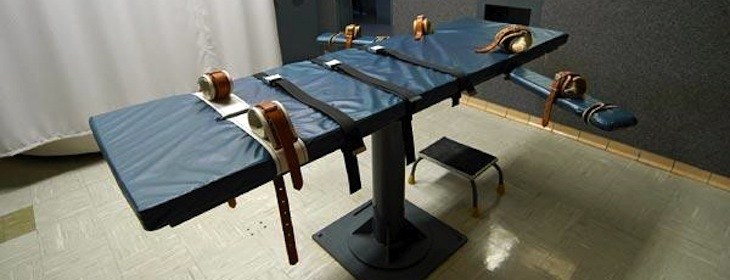Federal Judge grants injunction for one of eight men set to be executed in Arkansas (Updated)
by April 6, 2017 12:02 pm 839 views

Editor’s note: Story updated with several changes and additions.
–––––––––––––––––
U.S. District Judge D. Price Marshall on Thursday (April 6) granted an execution injunction request for Arkansas death row inmate Jason McGehee, and will wait to rule on the planned execution of Jack Jones. However, the judge denied an injunction for the other six inmates set to be executed in April.
Judge Marshall ruled the state cannot execute McGehee, 40, on April 27 because the state Parole Board on Tuesday recommended that Gov. Asa Hutchinson grant clemency. Under state law, there must be at least a 30-day period before the Parole Board makes that recommendation to have time for public notice and to provide notice to the circuit judge, the prosecuting attorney, the sheriff of the county where the conviction occurred, and the victim’s next of kin. McGehee has asked for a sentence of life in prison without the possibility of parole.
That would push McGehee’s earliest possible execution into May, which is after the state’s supply of midazolam, a sedative used in lethal injections, expires April 30.
Attorneys for the eight inmates argued that holding clemency hearings within 30 days of the execution dates was a violation of their due process. The motion, filed March 27, asked the federal court for a preliminary injunction to prevent the state from executing the prisoners on the appointed dates between April 17 and April 27 “so that the court may adequately consider their claims on the merits.”
On Wednesday (April 5), the Arkansas State Parole Board recommended in a 6-1 vote that Gov. Hutchinson grant clemency for one – Jason McGehee – of the eight men sentenced to be executed later this month. The board also voted against clemency for Kenneth Williams, set to be executed the same day.
Gov. Hutchinson on March 6 scheduled the eight executions for April, all for capital murder, on the following dates:
• April 17: Don Davis, Bruce Ward;
• April 20: Stacey Johnson, Ledelle Lee;
• April 24: Marcel Williams, Jack Jones; and
• April 27: Jason McGehee, Kenneth Williams.
Marshall ruled a possible injunction is on hold for a second condemned prisoner, Jack Jones, whose case will be heard by the Parole Board Friday. A recommendation to change the sentence would alter his timeline.
Regarding four others – Johnson, Lee, Marcel Williams and Kenneth Williams – Marshall declined to issue preliminary injunctions based on the likelihood of success, though their cases will continue. He said state law had been violated and the process has been “imperfect, “shoddy” and rushed, but the case does not warrant a preliminary injunction because it is not clear enough that the inmates’ constitutional due process rights have been violated.
He dismissed the part of the case where attorneys said the Parole Board’s actions had made their efforts more difficult. He said the inmates have known for many years “that this train was coming.”
“The state law violation has to be more than a technical foul to offend the Constitution,” he said. “It’s got to cut deeply and amount to arbitrariness or interference with these due process minimums that I mentioned before.”
Of the other two inmates, Bruce Ward’s motion was not granted because he did not apply for clemency. The eighth inmate, Don Davis, was not involved in the lawsuit.
Attorney General Leslie Rutledge’s spokesman, Judd Deere, said she is “considering all options.” He released a statement saying, “The victims’ families have waited far too long to see justice for their loved ones, and today’s decision from Judge Marshall allows all but one of the scheduled executions to move forward. Attorney General Rutledge will respond to any and all challenges that might occur between now and the executions as the prisoners continue to use all available means to delay their lawful sentences.”
Gov. Hutchinson set the dates for the executions Feb. 27 after a ruling by the U.S. Supreme Court opened the door for their occurrence, leading the Parole Board to compress the clemency process. The inmates’ lawyers say the state broke the law and acted arbitrarily.
After hearing arguments Wednesday, Marshall said he would consider the case and render a decision today. He explained his back-and-forth reasoning for 53 minutes, paused 43 seconds, and then finally announced his decision against the preliminary injunction “reluctantly.” Marshall said the judicial system has come to a conclusion regarding the inmates’ guilt for “horrible crimes” and that the court has no role in determining whether they deserve clemency. At issue is whether a violation has occurred of the inmates’ constitutional rights to due process, involving notice and a “meaningful opportunity to be heard.”
No state has executed eight people in so short a timespan, according to the Death Penalty Information Center. Texas executed eight prisoners in a calendar month in both May and June 1997. Arkansas is the only state to execute three inmates in one day, which it did Aug. 3, 1994, and Jan. 8, 1997.
The door to the executions was opened Feb. 21, when the U.S. Supreme Court denied a petition for a writ of certiorari regarding the state’s method of execution. The Arkansas Supreme Court earlier had ruled in the state’s favor in a case regarding Act 1096 of 2015 allowing makers of execution drugs to remain secret.
The state planned to use a three-drug protocol of midazolam, vecuronium bromide and potassium chloride. The state’s supply of midazolam, a sedative, expires April 30. Resupplying execution drugs has proven challenging because manufacturers do not wish to be associated with the death penalty for moral or public relations reasons.
Thirty-four men are on Arkansas’ death row. The last inmate executed was Eric Nance in 2005 for the rape and murder of Julie Heath of Malvern.
